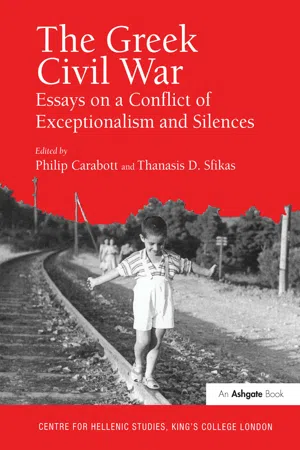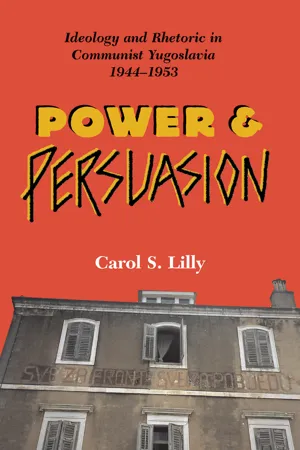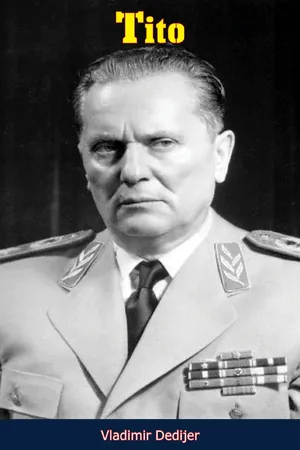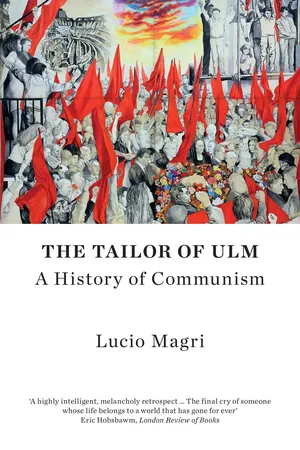History
Cominform
Cominform, short for Communist Information Bureau, was an organization established in 1947 by the Soviet Union and its Eastern European satellite states to coordinate communist activities and policies. It aimed to promote unity among communist parties and counter the influence of the United States and its allies during the early Cold War period.
Written by Perlego with AI-assistance
Related key terms
6 Key excerpts on "Cominform"
- eBook - ePub
Vanguard of the Revolution
The Global Idea of the Communist Party
- A. McAdams(Author)
- 2017(Publication Date)
- Princeton University Press(Publisher)
Thus, when the Soviet Union established a new “international center” four years later in September 1947, its closest allies would not have been surprised or, in most cases, even disappointed. This body, the Communist Information Bureau, or Cominform, had a much narrower focus. Aside from the Russian Communist Party (Bolsheviks) (RCP[B]), it was composed of only European parties, seven from the East and two from the West. Furthermore, it was primarily a tool for legitimation and propaganda. In Eastern Europe in particular, its function was to enable its members to justify their control over recalcitrant populations and to ensure that Moscow’s pronouncements about the correct road to socialism were affirmed. It would be tempting to characterize these developments as a simple story of Soviet domination. In such a depiction, one could emphasize the deliberate manner in which the Kremlin combined its military and economic might with its virtual monopoly on the rigid doctrine of Marxism-Leninism in order to impose its desires. 2 These factors are unquestionably important. Still, for two reasons, I believe that it is misleading to interpret this long period in communist history in such a narrow fashion. First, the records of the Comintern and the Cominform are interesting precisely because the Soviet Union’s leaders were constantly trying to sort out what they wanted from the two organizations’ members. From the 1920s onward, the twin pressures of a rapidly changing international environment and the Soviet transition from Bolshevism to Stalinism compelled Moscow to revise its expectations of its fraternal parties at least five different times. In the initial phase, the Soviets behaved like any power that suddenly finds itself in charge of an international movement. They struggled to balance their demands with their recognition of their allies’ differing expectations - eBook - ePub
The Greek Civil War
Essays on a Conflict of Exceptionalism and Silences
- Thanasis D. Sfikas, Philip Carabott(Authors)
- 2017(Publication Date)
- Routledge(Publisher)
It never became a decision-making instrument, its role being merely to ‘guide’ and to co-ordinate. Essentially it was an additional valuable tool of Stalinist authority – a component of the communist ideological and political strategy. In the main the Cominform acted as an accredited porte-parole of Soviet policy. According to Andrei Zhdanov’s drawing of the new geopolitical map, which perceived ‘the world as divided into two basic camps’, 7 the Cominform headed ‘the democratic and anti-imperialist camp’. From its very inception, therefore, the immediate political goals of this new organization were formulated as follows: the exercise of Soviet authority in the socialist camp; hardened opposition and mobilization of the masses in the capitalist camp; and a co-ordinated pursuit of the policy of the communist camp for peace. In fact these aims also reflected the Eurocentric dimension of the communist movement in 1945–49, that is, until the victory of the Chinese revolution. 8 Indeed, the invitation to participate in the Cominform’s organizational nucleus to only nine European communist parties 9 demonstrates that Soviet foreign policy focused its interest on Europe, which was then threatened by ‘Marshallization’. The setting up of the Information Bureau was a specific response to the Truman Doctrine and the Marshall Plan, exemplifying the simultaneous entrenchment and controlled offensive with which the communist world chose to counter the American presence in Europe - eBook - ePub
Power And Persuasion
Ideology And Rhetoric In Communist Yugoslavia, 1944-1953
- Carol S Lilly(Author)
- 2018(Publication Date)
- Routledge(Publisher)
The impact of CPY rhetoric on the Yugoslav population during this period is difficult to assess. For as in the immediate postwar era, contemporaries of the time have described the atmosphere from mid-1948 to 1950 as either exciting and hopeful or repressive and frightening, depending on their individual experiences and political affiliation. In either case, it seems that the confusion of the era generated a degree of public activism previously lacking. Whether manifested as support for or opposition to the regime, such activism served to revitalize state-society relations.Two Steps Backward
Attacks on the Opposition
One of the most immediate and tangible consequences of the June 1948 Cominform split was the party's increased reliance on force in dealing with political and ideological opponents. The party apparatus not only persecuted those members of the party and society who openly or secretly supported the Cominform resolution (known as Cominformists), but also applied blatantly coercive measures to all potential opponents of the party leadership both in and outside the CPY. The purpose was not only to squelch pro-Soviet elements within the country but to reemphasize the party leadership's dominant position. Consequently party leaders now renewed their attacks on many old opponents—including prewar party factionalists, the clergy "kulaks," and other "class enemies." As in 1945, numerous purges of "enemy" youth were conducted in the universities. The ground for increased repression against potential opponents outside the CPY had been prepared in the immediate pre-split period when party leaders openly admitted their socialist intentions and increased official emphasis on their guiding Communist ideology. The dramatically heightened rhetoric, arrests, and trials, however, came only after the split and focused first on real or suspected Cominformist agents within the party.8 - eBook - ePub
- Vladimir Dedijer(Author)
- 2018(Publication Date)
- Eschenburg Press(Publisher)
It was realized that there was no guarantee that Tito would return alive from such a meeting. The Yugoslav Communists were familiar with the methods of invitations to “consultation” used by Stalin and Molotov for those who disagreed with them. In 1937 the whole Politburo of the Ukrainian Party was opposed to Stalin’s Greater-Russian policy. Molotov arrived at Kiev on Stalin’s orders and went to the Politburo meeting. He failed to persuade a single member that the Ukrainians were wrong. Then Molotov convened the Plenum of the Central Committee, but its majority also declared itself for the Politburo. Several days later an invitation arrived from Stalin asking the Ukrainian Politburo to consultations in the Kremlin. They responded and set out for Moscow. As they entered the Kremlin, the N.K.V.D. arrested them all and Stalin later had them shot.Finally Tito informed Souslov of the Central Committee decision not to send a delegation to the Cominform meeting.The Russians reacted on May 22. Their letter was extraordinarily typical of them. It clearly confirmed they had founded the Cominform not as a consultative body for the exchange of views between Communist Parties, but as a weapon with which to impose their will upon the other Parties, especially the Yugoslav.Here are several passages from the letter:“Comrades Tito and Kardelj write that they feel ‘in such an unequal position that they find it impossible to consent to discuss this matter before the Informburo and moreover permit themselves to suggest that the Central Committee of the Soviet Communist Party has brought the Yugoslav leaders to such an unequal position.“The Central Committee of the Soviet Communist Party considers that there is not a grain of truth in this assertion. There is no inequality nor can there be for the Yugoslav Communist Party in the Informburo of nine Communist Parties. Everyone knows that during the organization of the Informburo all the Communist Parties were guided by the indisputable view that each Party should submit reports to the Informburo just as every Party has the right to criticize other Parties. It was this principle that the conference of nine Communist Parties had in view, when it heard the reports of the Central Committees of all the Communist Parties in September, 1947, without exception. The conference of the nine Communist Parties was guided by the equal right of every Party to criticize every other Party when it subjected the work of the Italian and French Communist Parties to severe Bolshevik criticism. - eBook - ePub
Red Adriatic
The Communist Parties Of Italy And Yugoslavia
- Eric R. Terzuolo(Author)
- 2019(Publication Date)
- Routledge(Publisher)
3 The Cominform Campaign, 1948–1954In the years after the Cominform Resolution appeared, most of the world's Communist parties conducted extensive propaganda campaigns directed against Tito's Yugoslavia. The Cominform parties also sent operatives into Yugoslavia to gather information and foment discontent, supported opposition forces within Yugoslavia and generally did anything possible to undermine Titoist power.One can take either a position of strict principle or a relativistic stance in discussing a given party's participation in these Cominform efforts. Coming from the former position, the fact that the PCI approved the various Cominform Resolutions and participated in "work in the direction of Yugoslavia" is the only relevant fact. Relativists, on the other hand, would regard differences in participation and enthusiasm as significant. Togliatti, by both temperament and intellectual predilection, was well disposed to a relativistic perception, and this perception still informs Italian Communist interpretations of Cominform history. But even Fernando Claudín, who spares no criticism of the Western Communist parties, adopts a relativistic approach.1 Comparisons between parties in terms of their support for and participation in the Cominform campaign seem significant and apt to result in meaningful distinctions.The PCI as a Hesitant Accuser
Although matters of degree are rather difficult to document, one has a definite impression that the PCI was hesitant to be cast as a major accuser of the KPJ. To take one example, the documents published in preparation for the October 1948 congress of the PCI Federation of Udine, where the dispute ultimately took on relatively bitter tones, do not even mention the Yugoslav conflict with the Cominform.2 a certain slowness in starting the campaign may have resulted from the assassination attempt against Togliatti in July 1948. Indeed, even after the PCI had accepted the Cominform Resolution, the KPJ expressed its solidarity with the PCI leader.3 While L'Unità did not devote much attention to events in Yugoslavia, Borba even reported on PCI successes in elections for workers' committees and expressed sympathy with the PCI-controlled national union, the Confederazione Generale Italiana Lavoratori (CGIL), seen to be under increasing attack from "Italian ruling circles."4 - eBook - ePub
The Tailor of Ulm
A History of Communism
- Lucio Magri(Author)
- 2019(Publication Date)
- Verso(Publisher)
The turn became explicit at the meeting near Wroclaw that gave birth to the Communist Information Bureau (Cominform). This was not a replica of the Communist International: first, because only ultra-loyal Communist parties (plus a couple that would later be accused of betrayal, the French and the Italian) were invited to attend the meeting; and second, because in the course of its brief life it met only rarely to issue directives or judgements, after the decisions had been taken elsewhere. The meeting’s lead player was unquestionably Andrei Zhdanov, whom Stalin then considered his spokesman, even though he often spoke his lines so emphatically that his ‘Report’ seemed to offer, in the crudest way, a new analysis of the situation and a new political line. His thinking is easy to summarize. The division of the world into two camps, hitherto presented as an enemy objective to be opposed, was now a fait accompli that Communists had to adapt to and even turn to advantage; there was no longer room for equivocation on either side, and the search for alliances was a secondary, or slippery, business. The Soviet Union was not only the natural political leader but the finished model, whose imitation was to be proposed to everyone everywhere. The capitalist camp was already entering a new economic crisis and the cold war would develop into an inter-imperialist war; its ruling groups were turning towards a new kind of authoritarianism. There was no point in fooling around any longer with the concept of ‘progressive democracy’, which was inevitably sinking into mere parliamentarism and obscuring the class struggle. Political unity should be based on the organic, codified ideology of Marxism-Leninism-Stalinism, of which the ‘History of the CPSU, Short Course’ was the finished synthesis. All sectors of culture (including science, literature and music) had to adopt an explicitly political viewpoint and express themselves in simple forms close to popular culture, avoiding any comparison with Western culture, including unorthodox Marxism and ‘degenerate’ avant-garde arts. This platform, conveyed in extreme terms that even Stalin would have avoided (and at one point slightly corrected), met with no resistance or objections at the Wroclaw meeting, only a few expressions of concern from Gomulka, Tito and Dimitrov, who subsequently became its targets of attack. The Chinese were not present, and anyway they were used to going their own way. Criticism and accusations – necessary, as always, to establish the limits of orthodoxy – were directed, as we shall see, against the French and the Italians.At the level of foreign policy and inter-state relations with the West, the infant Cominform confined itself mainly to counterproductive propaganda. Especially in the early years, there was never any hint of expansionist intentions. Even the Berlin blockade, which caused a period of tension in 1948, was presented merely as a protest against the arbitrary and unilateral decision to unite West Germany into a permanent state entity. The blockade was soon lifted, because instead of re-launching the serious proposal for a united, neutral Germany it helped to fuel West German nationalism and to underline the powerlessness of the Soviet Union to do anything about it.
Learn about this page
Index pages curate the most relevant extracts from our library of academic textbooks. They’ve been created using an in-house natural language model (NLM), each adding context and meaning to key research topics.





